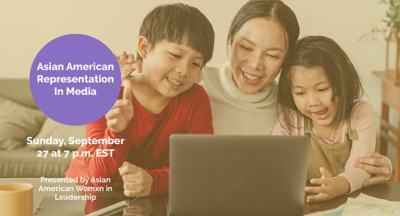With the growing popularity of Hollywood movies featuring Asian protagonists, such as “Crazy Rich Asians” and “Mulan,” discussions on Asian American media representation have become increasingly captivating and relevant.

The Asian Sisters Participating In Reaching Excellence, or ASPIRE, set out to address these on-screen characterizations Sunday in a conversation entitled “Asian Americans in Media.” ASPIRE is a Boston-based nonprofit established in 2001 that supports the professional and personal growth of Asian American girls and women, according to its website.
The organization, which is composed of more than 150 volunteers, incorporated clips from trending shows such as “Kim’s Convenience” and “Never Have I Ever,” as well as a stand-up comedy performance by Sierra Katow on “Dating a White Guy,” while addressing topics of family dynamics, romantic relationships and the racial stereotypes encompassing Asian American culture.
After viewing the clips, the group of more than 20 participants was divided into several virtual breakout rooms, where the discussion was fueled with personal interactions and networking opportunities.
Conference Director Oliva Chung said during the event what she hoped attendees would gain from the discussion.
“I’m really hoping to engage, educate and really empower Asian American women to become lifelong leaders,” Chung said.
The event was held as a preview of ASPIRE’s annual Asian American Women in Leadership Conference, where this year’s theme will be “reimagining our future and becoming the change,” ASPIRE volunteer Vicki Yu said.
Yu, who is working in community outreach for the conference, said in an interview that conversations about representation are important as a means to share personal experiences.
“We’re not really used to talking about the stories of our history and of our ancestors or of our experiences,” Yu said. “Having this group … you’re almost forced to talk about that in a positive way, and to learn other people’s experiences and to validate that my experiences make sense and actually are real.”
Yu said the upcoming conference in November is open to anyone who wishes to engage with the community, regardless of gender. She said it will be an opportunity to meet people and discuss relevant issues.
Kali Guise, an ASPIRE volunteer also doing community outreach for AAWIL’s conference, said the discussions surrounding those issues must involve audience perspectives and opinions.
“We wanted to talk about a topic that’s central to conversations in the Asian American community, and obviously representation in the media is one of those things,” Guise said in an interview. “The point of these events is to build community among the participants.”
Regarding the future of Asian American representation, Guise said she hopes typical media narratives become more diverse and inclusive of the broad range of experiences across Asian countries.
“At the moment, it’s predominantly East Asian and, more recently, South Asian stories that are being told,” Guise said. “We need to continue telling the stories of those communities, but the Asian American community’s not just Chinese and Japanese and Korean and Indian people. The Asian American community is incredibly diverse and complex, and it’s not this monolith.”
Denis Wu, a professor in the College of Communication at Boston University, investigated how Asian Americans are portrayed in television and in film for his 2009 book, “Media, Politics, and Asian Americans.”
Wu said in an interview that stereotypes — such as the model minority or the perpetual foreigner — still dominate coverage, and that Asian Americans are generally misrepresented or completely excluded in American media.
“The invisibility of Asian Americans in the media still remains,” Wu said. “The lack of representation still is an issue, even though the presence has increased recently.”
When it comes to his expectations for the future, Wu said having Asian American employees in the media industry is vital in sharing authentic characters and cultures.
“It’s imperative to really increase the visibility,” Wu said. “One of the fronts is to be working in the media, to be a journalist, to be a movie producer, director, actor, actress, things like that, so that you are actively participating in story-making and story production and distribution.”


























































































































